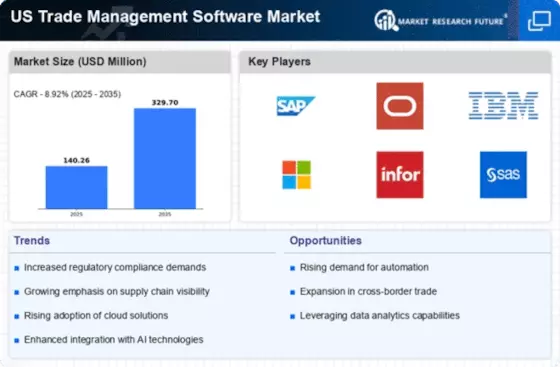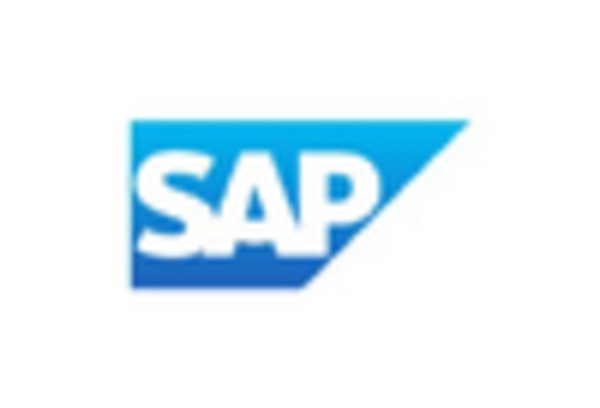Growing E-commerce Sector
The US Trade Management Software Market is experiencing a notable surge due to the rapid expansion of the e-commerce sector. As online retail sales continue to grow, businesses are increasingly seeking efficient trade management solutions to streamline their operations. In 2025, e-commerce sales in the United States reached approximately 1 trillion USD, indicating a robust demand for software that can facilitate cross-border transactions, manage tariffs, and ensure compliance with international trade regulations. This growth in e-commerce necessitates sophisticated trade management software that can handle complex logistics and provide real-time visibility into supply chains. Consequently, companies are investing in these solutions to enhance their competitiveness in the global marketplace.
Adoption of Cloud-Based Solutions
The US Trade Management Software Market is experiencing a shift towards cloud-based solutions, driven by the need for flexibility and scalability. Cloud technology allows businesses to access trade management software from anywhere, facilitating remote work and collaboration. In 2025, it was projected that over 60% of trade management software users in the US would prefer cloud-based solutions due to their cost-effectiveness and ease of integration with existing systems. This trend is likely to enhance the overall efficiency of trade operations, as companies can quickly adapt to changing market conditions and regulatory requirements. The growing acceptance of cloud technology is expected to be a key driver for the US Trade Management Software Market.
Integration of Artificial Intelligence
The US Trade Management Software Market is increasingly benefiting from the integration of artificial intelligence (AI) technologies. AI-driven solutions are enhancing the capabilities of trade management software by providing predictive analytics, automated decision-making, and improved data processing. In 2025, it was estimated that AI integration could reduce operational costs for US businesses by up to 30%. This potential for cost savings, coupled with the ability to optimize trade processes, is driving organizations to adopt AI-enhanced trade management solutions. As companies seek to leverage technology for competitive advantage, the integration of AI is likely to play a pivotal role in shaping the future of the US Trade Management Software Market.
Rising Demand for Compliance Solutions
The US Trade Management Software Market is witnessing a rising demand for compliance solutions as regulatory frameworks become increasingly complex. Companies are required to adhere to various trade regulations, including customs compliance and export controls. In 2025, it was estimated that non-compliance could cost US businesses over 1 billion USD in fines and penalties. As a result, organizations are investing in trade management software that can automate compliance processes, reduce the risk of errors, and ensure adherence to legal requirements. This trend underscores the importance of robust compliance features within trade management solutions, which are essential for mitigating risks associated with international trade.
Increased Focus on Supply Chain Resilience
The US Trade Management Software Market is significantly influenced by the heightened focus on supply chain resilience. Recent disruptions in global supply chains have prompted organizations to reassess their trade management strategies. In response, businesses are adopting software solutions that offer enhanced visibility and control over their supply chains. According to industry reports, approximately 70% of US companies are prioritizing investments in technology to improve supply chain resilience. This trend is likely to drive demand for trade management software that can provide real-time data analytics, risk assessment, and contingency planning capabilities, thereby enabling organizations to navigate uncertainties more effectively.

















